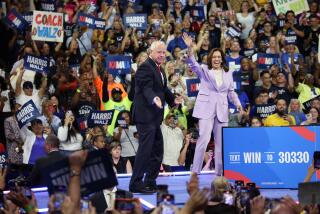Mahmoud Abbas opens Fatah’s first congress in 20 years
- Share via
BETHLEHEM, WEST BANK — Palestinian Authority President Mahmoud Abbas opened his Fatah movement’s first congress in 20 years Tuesday with a call to step up nonviolent resistance to Israeli occupation and to keep faith in peace talks despite years of setbacks to the dream of statehood.
But he stopped short of renouncing a clause of Fatah’s founding charter that prescribes “armed revolution” against the Jewish state.
“Although peace is our choice, we reserve the right to resistance, legitimate under international law,” he said, using ambiguous language that covers violent as well as peaceful action.
He said Palestinians must find consensus on “the proper forms” of resistance at any given time but made it clear that this is not the time for bloodshed.
Abbas spoke at the inaugural session of a long-delayed gathering to elect a new generation of Fatah leaders. The aim is to rally the secular movement, stigmatized by defeat and paralyzed by internal division, as a vibrant alternative to the Islamic militants of Hamas.
Abbas’ position as Fatah chairman was not on the line. But as more than 1,800 delegates began three days of private debates, it was unclear whether the 73-year-old leader could hold together the movement founded by the late Yasser Arafat and recently nurtured by the West as the mainstream Palestinian champion of compromise with Israel.
The congress opened in discord, with about 400 delegates from the Gaza Strip absent because the territory’s Hamas rulers had barred them from leaving. About 200 other Gaza delegates, who had left before the clampdown, showed up but threatened to walk out if the gathering held elections without the participation of their missing comrades.
Hamas, which stands to gain from a split within Fatah, said that it refused to let the delegates leave Gaza unless Abbas’ administration in the West Bank freed hundreds of Hamas prisoners.
The Obama administration, which is trying to revive Israeli-Palestinian peace talks, watched the meeting for signs of whether Fatah can avoid fragmentation, negotiate and enforce a peace accord, and govern a viable state.
Israeli officials were cautious in their assessment.
“The test will come afterward,” Defense Minister Ehud Barak said. “We will see what the leadership brings to the negotiating table.”
Fatah’s rules call for elections every five years. But the movement has not chosen a leadership body since 1989. Since then five of its 21 Central Committee members have died, and the others -- men who came of age in exile and are now in their 60s, 70s and 80s -- have resisted calls for new elections by a generation of younger activists who have lived their entire lives in the West Bank and Gaza, often skirmishing with Israeli soldiers.
During those two decades, Arafat launched an internationally acclaimed peace effort with Israel in 1993, founded the Palestinian Authority to administer the territories, unleashed a violent uprising in 2000, and died in 2004. Fatah, whose officeholders were widely accused of self-enrichment, lost its dominance when Hamas won the 2006 Palestinian Authority parliamentary elections and expelled Fatah’s police and paramilitary forces from Gaza in 2007. Abbas was elected president in 2005 for a term that expires next year.
In his speech, Abbas acknowledged that through “unwarranted behavior and weak performance, we became distant from the people.” He said changes in Israeli leadership had often moved peace talks back to the starting point, as when the current prime minister, Benjamin Netanyahu, this year set new conditions for Israel’s acceptance of a Palestinian state.
“It is the right of people to say . . . these negotiations are in vain,” Abbas said. “But still, there is a glimpse of hope, and we have to continue this way, for the interest of the people.”
Delegates will vote on a proposed platform that sets conditions for peace talks and advocates nonviolent protest reminiscent of the first Palestinian uprising, in the late 1980s and early ‘90s. That would distinguish Fatah more sharply from Hamas, which provoked a crushing Israeli offensive in Gaza in the winter by firing rockets into Israel for years.
Kadura Fares, a 47-year-old candidate for the Central Committee, said Fatah needed to become more effective in confronting Israel if it is to beat Hamas in elections and reunite the West Bank and Gaza.
Israel allowed exiles from across the Middle East to enter the West Bank for the congress, held in a Christian school near Bethlehem’s Church of the Nativity. Bedouins in white robes mingled with Fatah VIPs in business suits, women in slacks and former guerrillas in black T-shirts.
Wary of sentiment in favor of armed confrontation, Abbas made a nod to Fatah’s guerrilla legacy, telling delegates he was proud of his support for Arafat’s decision in 1964 to launch attacks against Israel.
But he said resistance today was better exemplified by the weekly marches and protests in Bilin and Naalin, West Bank villages that have lost hundreds of acres behind a barrier Israel erected.
“This kind of popular struggle should be strengthened and expanded,” he said.
Delegate response was mixed. “How did Fatah start? In armed resistance,” said Abdullah Abdullah, a member of parliament. “We cannot abandon our roots.”
“Yes, we’re condemned to resist; the question is how,” said Afif Safieh, a former diplomat. “A nonviolent approach will allow us to mobilize 100% of the society.”
Delegates said the issue was far less contentious than the race for 21 seats on the Central Committee and 120 on the Revolutionary Council. Politicking has been reflected in disputes over how many people could attend the congress and whether it would take place in an Arab country or on Palestinian soil for the first time. As candidates pressed to include supporters, the number of authorized delegates swelled from 650 to 2,260.
--
More to Read
Sign up for Essential California
The most important California stories and recommendations in your inbox every morning.
You may occasionally receive promotional content from the Los Angeles Times.













